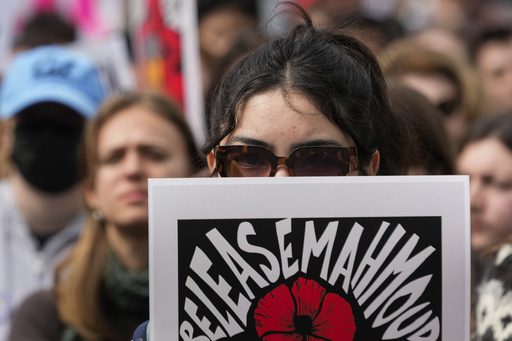Immigrant students and scholars are being detained at remote facilities in Louisiana over objections

A person holds a sign in support of detained Palestinian activist Mahmoud Khalil while protesting the Trump administration at the University of California, Berkeley campus Wednesday, March 19, 2025, in Berkeley, Calif. (AP Photo/Godofredo A. Vásquez)[ASSOCIATED PRESS/Godofredo A. Vásquez]
As U.S. authorities crack down on immigrants at universities in a fervor against pro-Palestinian protests, they quickly have shuttled some of those detained to remote facilities in Louisiana.
Lawyers for Mahmoud Khalil, the Columbia University graduate student facing possible deportation for his role in protests at that campus, are calling his imprisonment in Louisiana a “Kafkaesque” attempt to chill free speech.
Louisiana is emerging as a linchpin for immigrant detention in President Donald Trump’s second term, at facilities far from New Orleans and beyond the immediate reach of most rights groups and attorneys.
Immigrant detention in Louisiana surged during Trump’s first term at facilities adapted from state prisons and local jails.
At the time a state criminal justice overhaul had reduced the prison population, threatening the economies of small towns that rely on the lockups.
Officials in rural parishes signed contracts for immigrant detention that guaranteed millions in payments to local governments. Immigrants and their advocates complained of prolonged detention, mistreatment and isolation, including solitary confinement that sometimes resulted in death.
Louisiana is the No. 2 state today for immigrant detention by ICE, after Texas. About 7,000 immigrants are held there in civil detention, according to government data compiled by Syracuse University’s Transactional Records Access Clearinghouse.
The transfer of Khalil from the New York area to Louisiana complicates his legal fight to be released.
An attorney for the Department of Justice, August Flentje, wants the dispute litigated in Louisiana “for jurisdictional certainty.” A judge in Newark, New Jersey, heard jurisdictional arguments Friday and plans to issue a written ruling.
Immigration authorities are also holding 30-year-old Turkish student Rumeysa Ozturk at a detention center in Basile, about 170 miles (270 kilometers) west of New Orleans.
The Tufts University doctoral student was detained by immigration officials as she walked along a street in the Boston suburb of Somerville on Tuesday and transferred to Louisiana before a federal judge ordered her kept in Massachusetts.
Attorneys for another detained scholar, Alireza Doroudi, a doctoral student at the University of Alabama, said Friday that he was likely to be sent to an ICE center in Jena, Louisiana, a town of about 5,000 that is also far from major cities.
Doroudi, 32, initially was held at the Pickens County Jail in Carrollton, Alabama, after his arrest by immigration agents at his apartment in the middle of the night.
Doroudi was picked up because a visa was revoked in 2023, and his attorneys say he never participated in campus protests. The Department of Homeland Security said Doroudi poses a “significant national security threat” but did not elaborate.
Relatively few immigrants settle in Louisiana. Foreign-born residents there make up less than 5% of the population, compared with the national average of about 13%.
Trump’s inauguration-day executive orders and promises of mass deportations of “millions and millions” of people hinge on securing more money for immigrant detention beds.
The number of immigrants in ICE detention this month hit 47,892 — the highest since October 2019 — as the administration experiments with the use of offshore facilities at Guantanamo Bay Naval Station, Cuba.
Authorities also are using federal prisons to detain some people, returning to a strategy that drew allegations of mistreatment during Trum’s first term. The administration also recently resumed family detention of immigrants at a South Texas facility after a Biden-era pause.
Copyright 2025 The Associated Press. All rights reserved. This material may not be published, broadcast, rewritten or redistributed without permission.